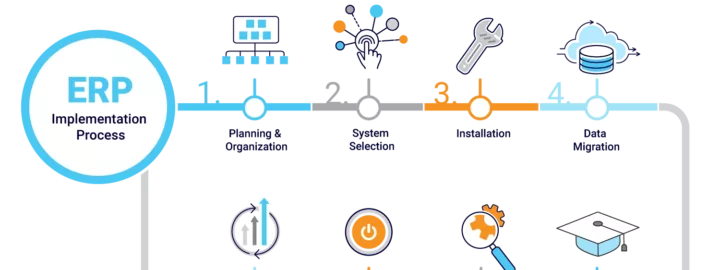Becoming a connected business and ensuring continuity of operations is important for all companies—but even more so for those in COVID-heavy regions. In this article, Thorsten Leppek, Acumatica’s Director of the Asia Region, provides strategies for tackling business challenges during uncertain times.

As life and the economy begin slowly returning to a “new normal” in many places around the world, countries in Asia are experiencing a spike in COVID-19 cases. State and local governments are again implementing lockdowns and allowing only essential businesses to operate.
Companies stifled by these lockdowns must ensure continuity of operations, so becoming connected businesses has never been more critical.
Ensuring Business Continuity
As Acumatica’s Director of the Asia Region, I am located in Thailand, and I have watched as the COVID-19 crisis here and throughout Asia has placed enormous economic strain on every company not deemed essential. However, I have also seen human resiliency and innovation rise to overcome these challenges and create a foundation for the post-COVID-19 business world.
Technological advances have given organizations the tools to become connected businesses and navigate distressed economies—tools such as cloud-based enterprise resource planning (ERP) solutions. Cloud ERP systems are centralized repositories that consolidate the data from every department in a business, making real-time information available anytime, anywhere. They help companies manage, connect, and automate various functions, including sales, financials, accounting, CRM, purchasing, inventory, distribution, manufacturing, and more. They also allow businesses to seamlessly integrate with essential third-party applications.
The right cloud ERP software can help a company become a connected business, which ensures continuity of operations, even during difficult times. Here’s how.
1. Remote Work and Mobile Access
For me, one of the biggest impacts of the COVID-19 pandemic was—and still is—my inability to travel. Before the pandemic, I traveled every week, visiting partners in different countries. Now, I can’t meet with my team or partners in person, which has forced me to change how I interact and communicate every day.
Cloud ERP technology lets me work remotely from any browser-enabled device. Regardless of where we are or what time it is, I, my team, and my partners have real-time, mobile access to our business management system. It’s a simple, effective solution to a pandemic-fueled challenge.
I recently spoke with the CEO of a leading packaging firm operating in Indonesia. When I asked how his factory was doing, he said that the government lets him open for two days, then makes him close again, then gives him permission to open right before he closes!
This instability is beyond frustrating, but having a flexible, remotely accessed solution can help businesses overcome ever-changing circumstances and enjoy success in uncertain times.
2. Customer Connection
The remote work and mobile access capabilities of cloud ERP technology also help me connect with customers—and help my customers connect with their customers.
This is facilitated by our cloud ERP system’s customer portal, which gives customers easy access to all of their information and lets them directly place orders without leaving home. This creates a safe, socially-distanced way to maintain business continuity, despite COVID-19 lockdowns—solidifying business relationships when in-person interactions are impossible.
3. Advance Planning
The 2021 supply chain issues, including the chip shortage, are affecting businesses globally. For most companies in Asia, these challenges have become extreme. For example, there are not enough shipping containers to move goods from one country to another or to import products to sell/distribute in local markets. I myself tried to send a welcome gift to a customer in Sri Lanka, but shipments to the area aren’t possible right now.
A cloud-based ERP solution gives companies the technology to plan for their supply orders in advance, helping them function more effectively around today’s supply chain issues. With accurate, updated information at their fingertips, they can also track inventory, manage logistics, and source alternative options when supplies are unavailable—even while working remotely.
4. Online Selling
Travel restrictions and quarantine requirements have stifled the global market. Online selling has become the go-to for businesses that have closed their brick-and-mortar stores. Products that wouldn’t have been “online friendly” before the COVID-19 crisis, such as machinery for factories, are now becoming common “add to cart” items online.
In “Better Together: SaaS Digital Commerce Platforms and ERP Help Organizations Grow Past Legacy Limitations,” IDC states: “The global COVID-19 crisis heightened the importance of customer experience and operational systems. In 2020, IDC saw a dramatic shift toward digital commerce as organizations moved business models overnight and accelerated the adoption of digital commerce levels previously expected for 2024.”
Cloud ERP software eases the shift to eCommerce operations, helping connected businesses manage omnichannel orders, customer support, accounting, inventory, fulfillment, and more from one centralized solution.
5. Cash Flow
With the COVID-19 crisis stretching across one-and-a-half years and, in some places, seeming to have no end in sight, cash flow has become a major issue. Companies have used up—or almost used up—their cash reserves. In some countries, such as Malaysia, only essential businesses are allowed to open their brick-and-mortar locations—which translates into zero revenue for nonessential companies, if they are tied to single-channel, traditional retail operations.
However, a cloud ERP solution can maintain business continuity and stimulate cash flow by helping businesses harness omnichannel sales and adapt, chameleon-like, to ever-changing uncertainties. For example, Acumatica customers can cancel modules they aren’t using and reimplement those modules when necessary. They can also downgrade or upgrade their resource levels as the business environment dictates.
Thrive with the Right Cloud ERP Solution
The COVID-19 pandemic has forever changed how we do business, and its full impact—including its ultimate economic effect—remains to be seen. Though some regions have begun to rebound, Asia is experiencing continued lockdowns and economic depression. It’s a challenging, stressful time, and we must seek ways to overcome it. The right cloud ERP solution is a strong foundation for success—offering critical mobile access for remote work, seamless connections with team members and customers, advance planning capabilities to mitigate supply chain issues, online selling tools to harness omnichannel opportunities, and cash flow strategies to maintain business continuity.
Acumatica does all this and more. Our award-winning cloud ERP solution has been the technological footing for companies successfully running their businesses before and during the COVID-19 pandemic. Businesses around the world are not alone in their struggles, and we’re here to help.













